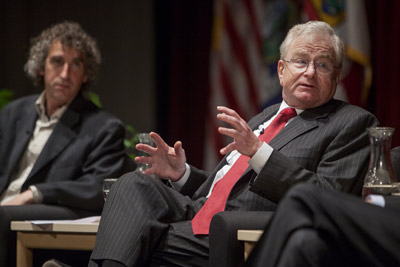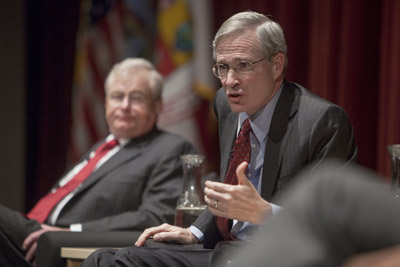Iran, Syria will take center stage, advisers say
By Susan Kelley


The United States must support the rebels in Syria, open a national debate on how to curb Iran's nuclear program and foster a positive relationship with China, said two former national security advisers Oct. 25 at Bailey Hall. And underpinning these foreign policy concerns is the need to build a sound U.S. economy, they said.
These are just a few of the daunting challenges the next U.S. president will face in trying to reassert America's leadership in the world, according to Samuel Berger '67, who served under President Bill Clinton 1997-2001, and Stephen Hadley '69, who served under President George W. Bush 2005-09.
"It's not enough to be strong in the world, you have to be smart. In a globalized world, smart means working with other nations on common objectives. It's important, I would say, for the president on day one to think about that proposition and how he's going to re-engage and energize the American people to our responsibilities in the world," said Berger.
The former national security advisers shared their insights into the realities confronting the next president and answered questions posed by Ithaca Mayor Svante Myrick '09; Kathay Feng '91, executive director of California Common Cause, a nonpartisan citizens' lobby organization; and moderator Jonathan Kirshner, professor of government and director of Cornell's Judith Reppy Institute for Peace and Conflict Studies. The event, "The World, the Day After," was part of Cornell's Trustee Council Annual Meeting.
Hadley called the nuclear situation in Iran "one of the hardest problems we've got." He compared it to the 2003 U.S. invasion of Iraq, saying that the Bush administration felt it had run out of options, and in one year's time we could find ourselves in the same position with respect to Iran, he said. In the meantime, the United States must construct a sequence of options, from sanctions to diplomacy and force. For example, Iran should be given robust benefits if it stops some aspects of its nuclear program, he said. "We need a national debate on what those options really are in a very sophisticated way where people aren't shouting at each other. ... And what better place to do it than at a place like Cornell University. I would hope there's a way you can participate in that dialogue. I think it's terribly important."
Syria is the "point of the spear" in the U.S. role in supporting the Arab spring, Berger said. The U.S. should send weapons and tactical support -- but not troops -- to the rebels battling the Syrian military, he said. Among other benefits, the support would position the U.S. to encourage democracy should the government fall and it could prevent a regional conflict.
Another area of concern is Pakistan, which Berger called "the problem from hell. Pakistan has all the ingredients of a migraine headache," he said. It has a weak democracy, nuclear weapons, internal terrorists and is largely anti-American. However, the United States must keep working on its relationship with Pakistan, because if the U.S. plans to withdraw from Afghanistan, we'll need Pakistan's cooperation, and because the most likely place for a nuclear exchange to take place is between Pakistan and India.
Berger and Hadley also offered advice to the next president and insights into what his first few days of his presidency might look like. The president usually first feels exhilaration on election night, followed by exhaustion, then a sense of opportunity and responsibility, Berger said.
There's a big learning curve for every new president, although serving as a state governor is a good training ground, Berger added. A first-year president is better than a second-year president, and a third-year one is better yet, Hadley said. Nonetheless, a new president must trust his instincts. "If you've gone through the gauntlet of being elected president, you are ready to make those decisions. ... If it doesn't feel right, don't do it. You're actually probably right," Hadley said.
Media Contact
Get Cornell news delivered right to your inbox.
Subscribe